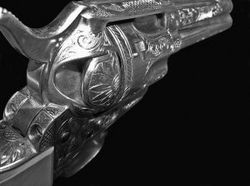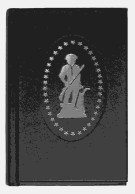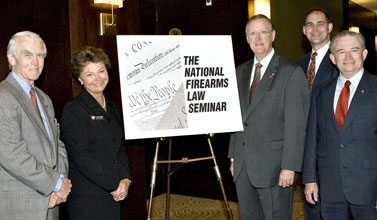Articles Posted in Firearms Case Law
McDonald v. Chicago Oral Arguments heard by Supreme Court Today
Some are calling McDonald v. Chicago – Heller for the rest of us.
A few minutes ago, at 10 AM EST the Supreme Court of the United States began hearing the oral arguments in McDonald v. Chicago, a major Second Amendment case that is expected to determine if states and cities must comply with the Second Amendment of the US Constitution.
Supreme Court to Hear 2A Case: McDonald v. Chicago
The Supreme Court has recently decided to hear the landmark Second Amendment case of McDonald v. Chicago. This case will address the application of the Second Amendment to the states through either the Due Process clause or the Privileges or Immunities clause of the Fourteenth Amendment. The case has major implications for the legality of restrictive gun laws not only in Chicago, but also in other cities across the United States. The decision to hear the case, which will be argued early next year, gives Second Amendment advocates across America hope that this fundamental freedom will not be infringed by unreasonable state and local laws.
Previously the U.S. Court of Appeals for the Seventh Circuit held that the Second Amendment does not apply to state and local governments. That opinion left in place the current ban on the possession of handguns in Chicago.
Many legal scholars believe that the Seventh Circuit should have followed the lead of the earlier Ninth Circuit panel decision in Nordyke v. Alameda County, which found that those cases don’t prevent the Second Amendment from applying to the states through the Due Process clause of the Fourteenth Amendment. To the contrary, a proper incorporation analysis supports application of the Second Amendment to the States.
Constructive Possession: NFA Trusts vs Individual Ownership
 The NFA defines who can own a Title II firearm as a natural person, corporation or trust…. When an individual makes application to own a Title II firearm they are the only person who can be in possession or have access to the firearm. This creates a problem for many individuals who are married, have others who know the combination or how to gain access to the items, or want to allow others to use the firearms, even in their presence.
The NFA defines who can own a Title II firearm as a natural person, corporation or trust…. When an individual makes application to own a Title II firearm they are the only person who can be in possession or have access to the firearm. This creates a problem for many individuals who are married, have others who know the combination or how to gain access to the items, or want to allow others to use the firearms, even in their presence.
Joshua Prince has written and excellent analysis of the case law surrounding constructive possession and the US v. Turnbough case which stated that the Government may establish constructive possession by demonstrating that the defendant exercised ownership, dominion or control over the premises in which the contraband is concealed. Joshua goes on the state that if a spouse or other person does have the combination to the safe where the NFA firearms are kept it would be virtually impossible for the prosecutor to show that the other individual knowingly has the power to exercise dominion and control over the firearms.
The real problem occurs when another does have access to the items or can exercise dominion and control over the NFA firearm because the prosecutor can then charge that individual with constructive possession. In US v. Turnbough, an illegal firearm was in Turnbough’s home and the court of appeals found that a reasonable jury could have found that he, his live in girlfriend, and her child could conclude that all three parties exercised dominion and control over the gun and the possession could be either sole or joint.
Can a Felon Possess a Firearm in Florida?
 At first glance, Florida has a funny quirk with the way firearms are defined that allows a Felon to possess certain firearms that are not defined as firearms under Florida law. Upon further investigation, the federal law also exempts antique firearms from the definition of a firearm. I was recently asked if a convicted felon could possess a black powder gun for hunting in the state of Florida. The answer to this question depends on the gun itself.
At first glance, Florida has a funny quirk with the way firearms are defined that allows a Felon to possess certain firearms that are not defined as firearms under Florida law. Upon further investigation, the federal law also exempts antique firearms from the definition of a firearm. I was recently asked if a convicted felon could possess a black powder gun for hunting in the state of Florida. The answer to this question depends on the gun itself.
Florida Statutes 790.001(6) defines a Firearm as as any weapon (including a starter gun) which will, is designed to, or may readily be converted to expel a projectile by the action of an explosive; the frame or receiver of any such weapon; any firearm muffler or firearm silencer; any destructive device; or any machine gun. The term “firearm” does not include an antique firearm unless the antique firearm is used in the commission of a crime.
Florida Statutes 790.001(1) defines an Antique Firearm as any firearm manufactured in or before 1918 (including any matchlock, flintlock, percussion cap, or similar early type of ignition system) or replica thereof, whether actually manufactured before or after the year 1918, and also any firearm using fixed ammunition manufactured in or before 1918, for which ammunition is no longer manufactured in the United States and is not readily available in the ordinary channels of commercial trade.
So it would appear that a Felon could own certain black powder guns in Florida as long as the firearm was not used in the commission of a crime. There has even been some case law dealing with black powder firearms owned by a felon.
The Second Amendment Does Apply to the States: Nordyke v. King
The U.S. Court of Appeals for the Ninth Circuit issued its eagerly anticipated ruling in Nordyke v. King
yesterday, holding that the 2nd Amendment of the US Constitution protects the individual right to keep and bear arms against violation by state and local governments. The court upheld the ordinance and stated:
We therefore conclude that the right to keep and bear arms is “deeply rooted in this Nation’s history and tradition.” Colonial revolutionaries, the Founders, and a host of commentators and lawmakers living during the first one hundred years of the Republic all insisted on the fundamental nature of the right. It has long been regarded as the “true palladium of liberty.” Colonists relied on it to assert and to win their independence, and the victorious Union sought to prevent a recalcitrant South from abridging it less than a century later. The crucial role this deeply rooted right has played in our birth and history compels us to recognize that it is indeed fundamental, that it is necessary to the Anglo-American conception of ordered liberty that we have inherited. We are therefore persuaded that the Due Process Clause of the Fourteenth Amendment incorporates the Second Amendment and applies it against the states and local governments.
Many were hoping for a ruling forbidding states from abridging fundamental rights of citizens but the Ninth Circuit rejected this view in citing the Slaughter-House Cases as precedent. In doing so it applied the Second Amendment to the states through the 14th Amendment. Many are hopeful that the seemingly distorted view of the 14th Amendment will be changed one day to reflect its original interpretation.
District of Columbia V. Heller

The NRA is offering a special book by Les Adams, author of The Second Amendment Primer, which deals with the Heller decision.
You can order a signed copy of the District of Columbia v. Heller: An Anatomy of the Supreme Court’s Landmark Second Amendment Decision from the NRA’s Affiliate Palladium Press. You can also call them at 1-888-397-3377.
Leonard Elliott’s Story of an ATF Raid on His Gun Store
Leonard Elliot’s store was raided by the ATF almost 3 years ago. After a 3 day trial he and his father were found not guilty on all counts.
JPFO has an audio interview with Leonard Elliott about his ordeal. To listen to this interview click the following link leonard-elliott.mp3 target=new
First Court interpretation of Florida Guns at Work Law
Florida Employers have to let employees keep guns in their cars if they have a concealed weapons permit. But, businesses can still have a no gun policy for customers for now.
U.S. District Judge Robert L. Hinkle states that there is no second amendment right to bring your gun to someones property and that customers would have the same right as employees under the new legislation but for the working of the statute which may be fixed later.
The law defines employer as a business with employees who own guns.
NFA Wepons and Crime
While the public perceives NFA weapons as dangerous Guncite.com reports that there have only been two murders since 1934 involving legally registered Machine Guns and one of those was by a police officer.
 NFA Gun Trust Lawyer Blog
NFA Gun Trust Lawyer Blog


